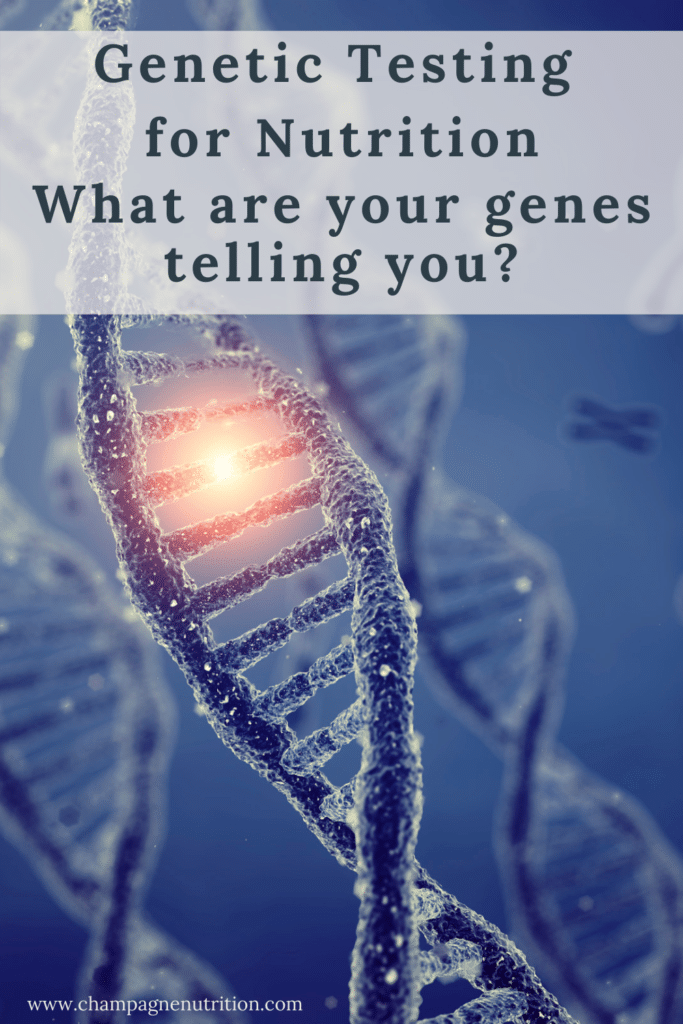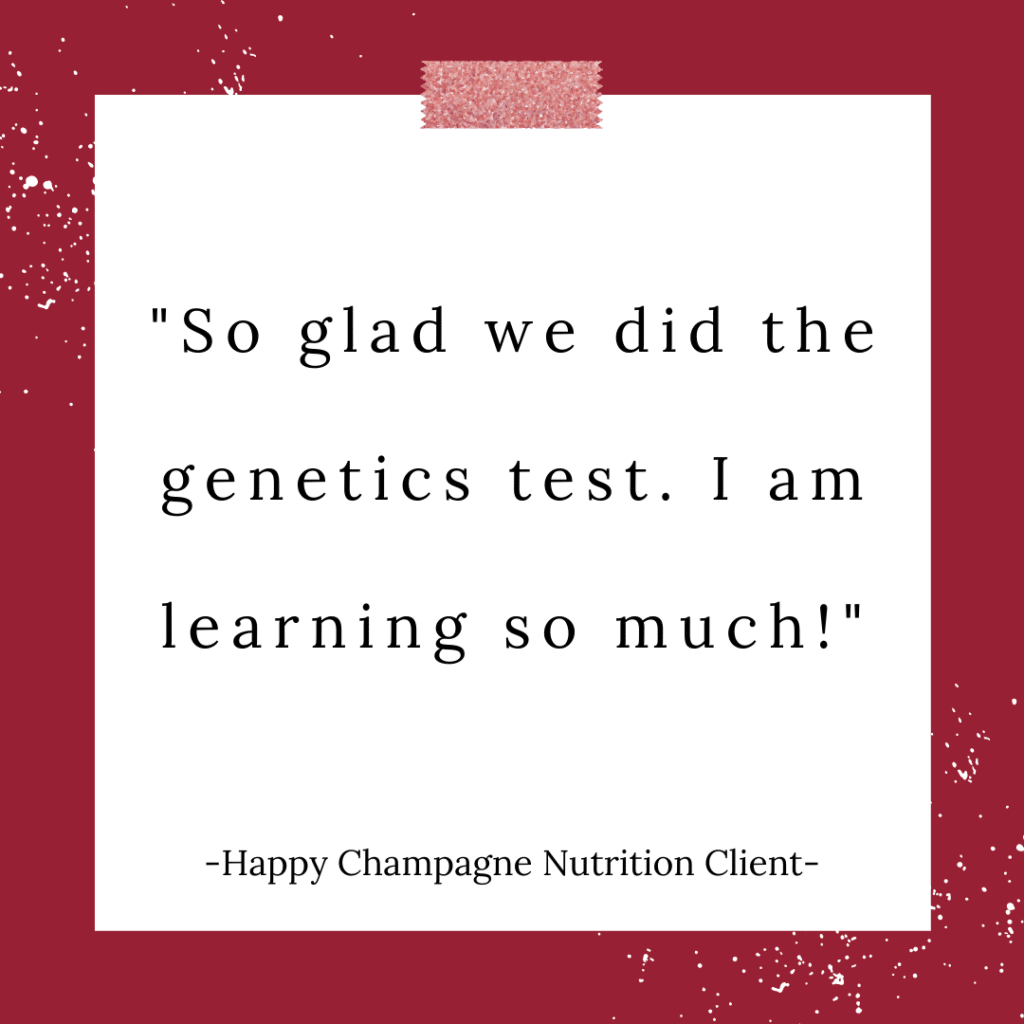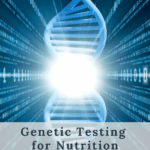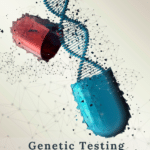Nutrigenomics Testing
February 15, 2021 by Ginger Hultin MS RDN
I talk a lot about genetic testing for nutrition (or nutrigenomics…or just genomics depending on what you like to call it) – to fellow dietitians, physicians, naturopaths and other medical providers. But I realized that I haven’t’ talked a lot about it to YOU: my community! If you’re not on my newsletter, join immediately here so we can stay in touch. I’ve noticed that more and more people are coming to me for help with nutrition and they want to know how nutrigenomics testing can help them personalize their plan. So I’m going to explain what it IS (and what it isn’t), why there’s so much spammy/scammy stuff out there in this space, and how it may be able to help you reach your nutrition and health goals.
Learning About Nutrigenomics
This is the first step and if anyone is trying to sell you genomic testing that isn’t a medical provider who specialized in genomics (we’re talking MD, ND, nurse, or registered dietitian nutritionist), then you need to walk away. I’ve been approached by a lot of people who call themselves coaches or “nutritionists” who are working in this space and it just simply isn’t safe or ethical. So let me tell you about how I got into this field – I hope you’re already wondering – because it’s really, really important.
As you know, I’m a registered dietitian nutritionist with a masters degree in nutrition. I’m working on my doctorate of clinical nutrition right now as well. Dietitians or “RD”s are required to have a university degree in nutrition, complete 1200+ hours of supervised practice (ie: clinical rotations in hospitals for a year), pass a national examination, and then complete a set amount of continuing education every five years. Different states will also license RDs for the work they do.
My background is very clinical – the VA hospital, level 1 trauma hospital, oncology clinics – but when I got the opportunity to work at a start-up here in Seattle that focused on very personalized medicine through concierge nutrition which included blood and genetic testing, I jumped at the chance to learn something new. I spent nearly 4 years at Arivale (which is no longer, sadly!), and received in-depth training from the best scientists in the industry including a founder who helped map the human genome in 2003. Because of this I’m picky, picky, picky about genomic testing. And I’m a skeptic…but I’ve also seen the power in it. Nutrigenomics testing is incredible and it changes lives.
If you’d like more resources or want to see some of the work I’ve done in the nutrigenomics space, here are some interviews, pieces I’ve written, and lectures I’ve given that an help you learn more:
- Nutrigenomics: Future or Fad – Food & Nutrition Magazine
- The Future of Nutrigenomics – Today’s Dietitian Magazine
- Genetics playing a growing role in intersection of nutrition and Health – Baltimore Sun
- The secret to losing weight and keeping it off – The Columbus Dispatch
- The Role of Nutrigenomics for the Registered Dietitian – webinar
- Unlocking Precision Nutrition Care: is Genetic Information the key? – webinar
What Nutrigenomics Testing Is
Your genes are your genes; they don’t change and that’s not the goal of our work together. Your genes are constantly interacting with your environment (including exercise and what you eat!) and your environment is constantly affecting your genes and how they “express” themselves. You can imagine a light switch flipping on and off. Gene expression – the way they show themselves in our body and behavior – is controlled by a complex system of enzymes and those signals can both up-regulate and down-regulate which genes are showing themselves at any given time.
Let’s talk about an example of this. Many people come to me with weight-related questions. There are genes that are connected to a higher or lower body weight. That alone can be helpful to know: “Oh! I have that gene”. Then the results can give us guidance on what to do. There are gene variants that tell us how much exercise may be needed for a person with this particular type of gene to be more likely to achieve fat loss. Or there are genes that tell us that eating less saturated fat may be a good consideration because human studies have shown a correlation with more fat loss for people with a particular gene who eat lower saturated fat.
Listen, these types of genes, genetic testing for nutrition genes, are not your destiny. What’s important is that you know what you’re working with and you have a path forward on what to do to optimize what you’ve got and move towards your goals in a targeted way.

What You’ll Learn with Nutrigenomics Testing
What you CAN learn can be life-changing. The research does clearly show that, when people work with a medical provider to help make connections to their individual goals and lifestyle to make the genetic information actionable, that behavior change does happen. You’ll learn information about:
- Appetite
- How much you eat/satiety
- Inflammation
- Fat accumulation in the body
- How much energy you may naturally expend (and how much you may need to exercise!)
- Your body’s response to exercise
- How likely you are to gain weight (or how easy it can be to lose it)
- What type of training to do and how to recover
- Your predisposition to injury
- What nutrients may have trouble being absorbed or utilized in your body
- How caffeine may affect you; information about the timing of eating/drinking certain foods
- Your predisposition to blood pressure or cholesterol issues
- What you need to know to protect your bone and joint health long-term
- How your body regulates blood sugar and the hormone insulin
- What your natural detoxification response may be
- Information about your memory, cognition, moods and behaviors
Best of all (and most importantly), you’ll find out exactly what to DO with this information to influence your life. Just knowing it changes nothing. You need someone to help interpret the results, make connections, and bring your personal story to life. If you should exercise more…how? What type is best? When will you fit it in? How will you keep away from injury? If you should eat more vegetables…how? What if you don’t like veggies? What kinds are best? How can you prepare them so that they taste good? This is exactly what we’ll cover and then you’ll finally get that accountability to stick with the changes long-term to make them permanent in your life. No more roller coaster of frustration.

What Nutrigenomics Testing Isn’t
I can’t overestimate how important this point is: nutrigenomics and the type of direct-to-consumer testing that I do is NOT medical genetic testing and it’s not diagnostic of diseases. Some people are hesitant to seek it out because they are worried that they’ll learn things they don’t want to know – like if they may be at increased risk for Alzheimer’s Disease or a type of cancer. A very common test that some women will get done with a medical geneticist is a test for BRCA gene mutations to assess their risk for breast and ovarian cancers. Another type of common genetic testing is if you are trying to conceive. Many people will get genetic carrier screening tests. This is NOT nutrigenomics testing. They’re very different scopes of practice so if those are the types of tests you need, your primary care physician should be able to guide you to a specialist.
What You Won’t Learn with Nutrigenomics Testing
There are a lot of things that genetics just can’t tell us. As the research continues to expand and improve, we’ll learn more and there will be much more information about how human genes affect health. But for now, there are a lot of limitations. If you’re looking for the following, genetic testing for nutrition isn’t the answer but there are places you can go to find these things out:
- Exactly what to eat (like specific foods)
- Which foods you’re allergic or sensitive to
- Risk of specific diseases (like cancers)
- If you’re allergic/intolerant to gluten or have Celiac disease
- How to improve your gut health/what’s going on with your gut microbiome
How do I Know who to Trust?
I hear you on this. It’s really hard. There are a lot of people out there promising miracle ‘cures’, trying to sell you supplements or products based on your results, or offering information that isn’t backed by science or research in any way. Friends, family, colleagues and clients often send me links to genetic products and programs asking “is this one legit?”. Sometimes the answer is yes. Often it’s no. Sometimes it’s ‘is this even a real company!?” And that’s a hard no right away.
You can definitely trust someone that is a healthcare provider more than someone who isn’t. You should ask the person you’ll be working with about their education, credentials, and background and training in genetics. They should be able to describe why they work with the direct-to-consumer company they work with and how they’ll use the information you both receive to help you reach your goals. Even if you don’t know a lot about genetics yourself, these are some good places to start. The person you’re talking to and considering working with should also be able to explain whatever you want to know in a way that you truly understand it and feel comfortable with.
What About Privacy?
This is huge. You definitely need to know who’s got your genetic information, where it is stored, what they can and cannot do with it and what they’re doing to protect your privacy. A company’s privacy statement should be extremely easy to find, easy to understand and very clear. If you have question about it, you should be able to contact them immediately.
You are protected by HIPAA as well as the Genetic Information Nondiscrimination Act so I’ll link right here for more information if you want to read up on these. I definitely understand concerns and questions about privacy – it’s very serious. However, I see this as a barrier to people doing genetic testing for nutrition when they really want to and it could very much benefit them so instead of just saying “no” – consider gathering more information and working with a company that you can talk to and trust.
How Nutrigenomics Testing can Help you Reach Your Nutrition and Health Goals
If you’re intrigued, great! You should be! This isn’t for every person – some of you have already had it done, some people have other things that they need to work on with me that are more time sensitive, and some people just aren’t interested. I’d say about 50-60% of the people I work with do nutrigenomics testing and it’s a really fun way to partner with a nutritionist.
Please know that you absolutely do not have to do nutrigenomics testing – a lot of people don’t and that’s ok, too. Everyone is different. But if you’re interested…you should really consider it.
Ok: I’m SO in and I Want Nutrigenomics Testing
Great! I do it all the time with my patients. It’s some of my most favorite work to do. These are the steps to getting started:
- Shoot me a message here telling me a little more about why you’re interested and what you’re struggling with
- We’ll do a quick call so I can learn more about if nutrigenomics testing is a good fit for you
- We’ll jump into working together, you’ll complete your online paperwork and I’ll have the test sent to your home
- You’ll complete a simple cheek swab to collect some genes and you’ll drop it into a USPS box near you
- When the results come back, we’ll weave all that data into our work together and use it to change your life
- We’ll revisit the results again and again during our work together, using it to truly personalize all recommendations
7 Comments
Leave a Comment

Ginger Hultin,MS, RD, CSO
Thanks for visiting! If you're struggling with a cancer diagnosis, autoimmune condition, gut health problems, or even a medical mystery, nutrition can make a HUGE difference in your day-to-day life. I run a virtual, concierge private practice where I partner with my clients over time to help them improve their health through nutrition. Be sure to visit the blog for easy, plant-based, anti-inflammatory recipes and our "Resources" page for a variety of self-paced programs, books, e-books, and nutrition podcast episodes.



Absolutely! And this difference likely depends, at least in part, on genetic variation.
DNA can provide useful information and insight. But I remain sceptical of all the commercial sites selling DNA related services, particularly when they request additional information such as gender, height, weight and body type.
Ah interesting – yes, the one that I use doesn’t ask that additional info and also, it’s only direct to health professional. I’m so with you – it’s important to remain diligent and ask these important questions!
I’ve become quite skeptical of genetic testing now that 23 and Me came out and admitted to selling data to a pharmaceutical company. That was just what made me hesitant from the beginning. Having some genetic understanding of what you’re prone to (diseases, malnutrition in some areas, addiction tendencies, etc) can be helpful. But I would only be open to those if done in a controlled test that I know won’t have data sold to someone else.
That’s a really great point! When I talk to my clients about genetic testing companies, I always share the privacy policy with them and provide information so that they are 100% sure of how their data may be used. It’s a really important part of the conversation and people’s comfort level. I trust the company that I work with a lot and my clients are always comfortable with the information that they share about their privacy.
Wonderful post
Thanks so much!